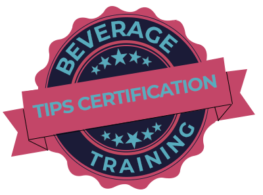Connecticut’s TIPS (Training for Intervention Procedures) certification program is a vital initiative focused on promoting responsible alcohol service within the state. This comprehensive program provides individuals employed in the hospitality industry, particularly those involved in alcohol service, with the knowledge and skills necessary to ensure the safety and well-being of both customers and the community. Whether you work as a bartender, server, manager, or in any role connected to alcohol sales and service, obtaining a TIPS certification in Connecticut is more than just a requirement; it’s a commitment to nurturing a culture of responsible alcohol consumption and mitigating the risks linked to excessive drinking.
Connecticut does not currently enforce mandatory responsible alcohol training. Nevertheless, it is highly recommended that anyone involved in the sale or service of alcoholic beverages in the state of Connecticut voluntarily undergo and successfully complete a responsible alcohol course. This proactive measure serves to safeguard both the individual and their employer from potential legal ramifications, ensuring a safer and more responsible alcohol-serving environment for all parties involved.
Connecticut TIPS Certification Training Program
| Course Name | Hours | Price | Checkout |
|---|---|---|---|
| TIPS On-Premise Alcohol Server Training | 3 | $34.99 | Enroll |
| TIPS Off-Premise Alcohol Seller Training | 3 | $34.99 | Enroll |
| TIPS Off-Premise & Alcohol Delivery Training | 3 | $34.99 | Enroll |
| TIPS Concessions Alcohol Training | 3 | $34.99 | Enroll |
| TIPS Gaming Alcohol Training | 3 | $34.99 | Enroll |
| TIPS Replacement Card | $20.00 | Enroll |
What are the Aims and Objectives of Connecticut TIPS Certification Training?
- Protecting Against Liability: Ensuring the safety of both yourself and your establishment involves understanding and following responsible alcohol service practices to minimize legal and financial risks.
- Understanding Alcohol’s Impact on Customers: It’s crucial to comprehend how alcohol affects your patrons, both physically and behaviorally. This understanding helps in identifying signs of intoxication.
- Recognizing the Effects of Alcohol: Being able to recognize the signs of alcohol impairment in your customers is vital for responsible service. This includes observing changes in behavior, speech, and coordination.
- Preventing Over-Intoxication: Implementing strategies to prevent customers from becoming overly intoxicated is essential. This involves monitoring the pace of their alcohol consumption and intervening when necessary.
- Intervening in Refusal Situations: There are occasions when you must refuse to sell alcohol to a customer. Knowing how to diplomatically and responsibly intervene in such situations is crucial for both their safety and your legal protection.
- Handling Disturbances: In the event of disturbances or unruly behavior, having a plan in place to address these issues safely and effectively can help maintain a peaceful environment.
- Effective ID Checks: Accurate identification checks are crucial for ensuring that customers of legal drinking age are served. Knowing how to properly check IDs and recognize potential forgeries is key.
- Preventing Second-Party Sales: It’s important to be vigilant against scenarios where a legal-age customer purchases alcohol for a minor. Preventing second-party sales helps maintain legal compliance and safety.
- Refusing Sales: If a customer does not meet the legal requirements for alcohol purchase, understanding how to confidently and respectfully refuse the sale is an essential skill in responsible alcohol service.
What are the Essential Reasons behind Connecticut Alcohol Server TIPS Certification Training?
One compelling reason to consider Connecticut Alcohol Serving Training is your employer’s potential requirement. Many owners and managers of licensed alcohol-selling establishments mandate responsible seller training. This requirement is not without cause, as violating alcohol sales laws can lead to severe repercussions.
The Connecticut Liquor Control Commission maintains a strict stance on underage drinking, with harsh penalties for non-compliance. Selling alcohol to a minor is categorized as a Class A misdemeanor, resulting in potential fines of up to $1,000, imprisonment for up to one year, or both.
Moreover, your liability extends beyond legal fines, if you serve alcohol to a visibly intoxicated individual who subsequently causes a car accident, you could be held responsible. For adults, the liability cap is set at $250,000. However, if the intoxicated person is under 21, there is no limit to your potential liability.
In light of these significant consequences, pursuing Connecticut Alcohol Serving Training is not just a legal requirement but also a responsible and prudent step in safeguarding your career and financial well-being.
Where Can I work If I Attain the Alcohol Server Training Certificate?
- Bars and Pubs: You can work as a bartender or server in bars, pubs, and taverns.
- Restaurants: Many restaurants serve alcohol, and your certificate would qualify you to serve alcoholic beverages to customers.
- Hotels: Hotels with bars or restaurants often hire certified alcohol servers.
- Nightclubs: Nightclubs and entertainment venues that serve alcohol require trained staff to ensure responsible service.
- Banquet Halls: Event venues that host weddings, parties, and other gatherings often serve alcohol, creating opportunities for certified servers.
- Liquor Stores: Some liquor stores may hire certified individuals for responsible sales.
Understanding and meeting Connecticut’s bartending license requirements is essential for a successful career in the state’s hospitality industry. Completing a certified alcohol seller and server training program and keeping a valid certificate ensures compliance with state rules and helps create a safer and more enjoyable experience for your customers.
For How Long the Certificate is Valid For?
The training certificate is valid for 3 years from the date of its completion.
What’s the Legal Minimum Age to Serve Alcohol in Connecticut?
The legal age to serve in Connecticut is 18 years old. Individuals must be at least 18 years of age to serve, sell, or handle alcohol in establishments like bars, restaurants, or liquor stores.
